You may overlook the need to achieve or improve scalp health. However, the scalp influences hair growth, texture, shine, and thickness. These attributes are the top signs of healthy hair. Hence, the need to improve your scalp health. This blog article explores simple ways to improve scalp health.
1. Regular Cleansing Routine
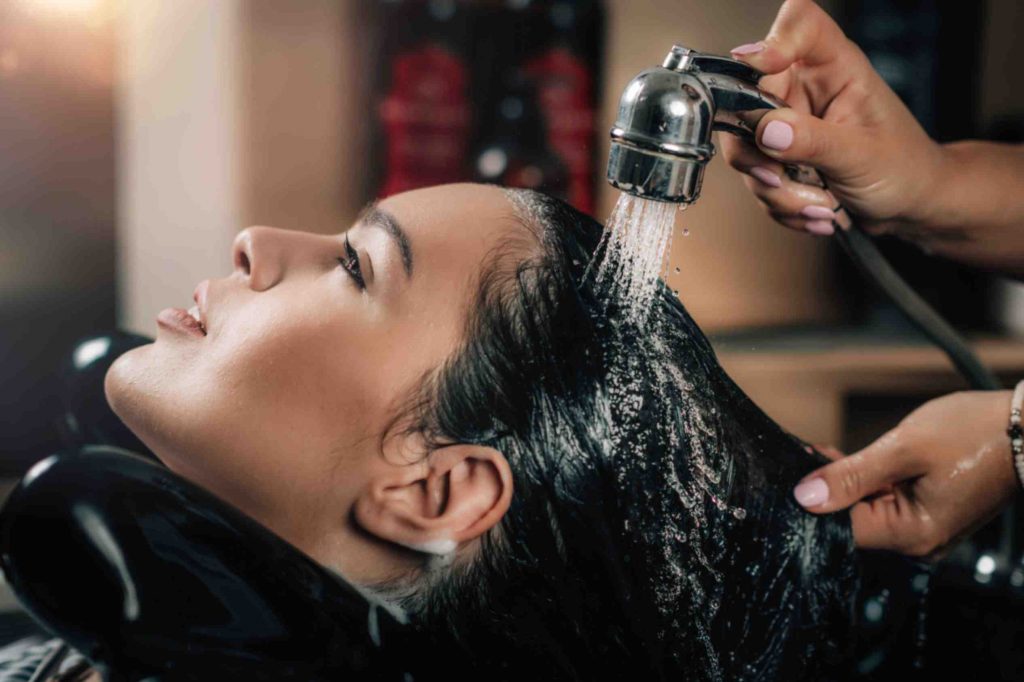
How often do you cleanse your scalp? Without scalp cleansing dirt and oil can ruin its health and inhibit hair growth.
Importance of Regular Scalp Cleaning
Dead cells from the skin and sebum can clog skin pores and hair follicles. Combined with products for healthy hair, these elements can cause scalp buildup. Eventually, bacterial growth, scalp irritation, and other problems can happen. To avoid them, experts recommend scalp cleansing with a quality, clarifying shampoo.
Choosing the Right Shampoo for Your Scalp Type
The best shampoo for scalp health has the following attributes:
- It is gentle
- It allows the scalp to retain some sebum
- It helps safeguard the scalp microbiome
Instead of a strong sulfated cleanser, haircare experts recommend a sulfate-free shampoo. A sulfated cleanser can strip your hair, removing natural oils from the scalp. Also, a co-wash shampoo is better than a traditional one. However, this depends on your hair type.
How Often Should You Wash Your Hair?
Washing the scalp up to three times per week is enough because over-washing can harm your sensitive scalp. Signs of overwashing the scalp include irritation, dryness, and itchiness. Please reduce your washing frequency if you notice these signs. Also, use a dry shampoo to make your hair feel clean and extend the time between the wash intervals.
Maintain scalp health with regular cleansing using a gentle shampoo, preventing buildup and promoting hair growth. Avoid over-washing to prevent irritation and dryness.
2. Gentle Scalp Massage
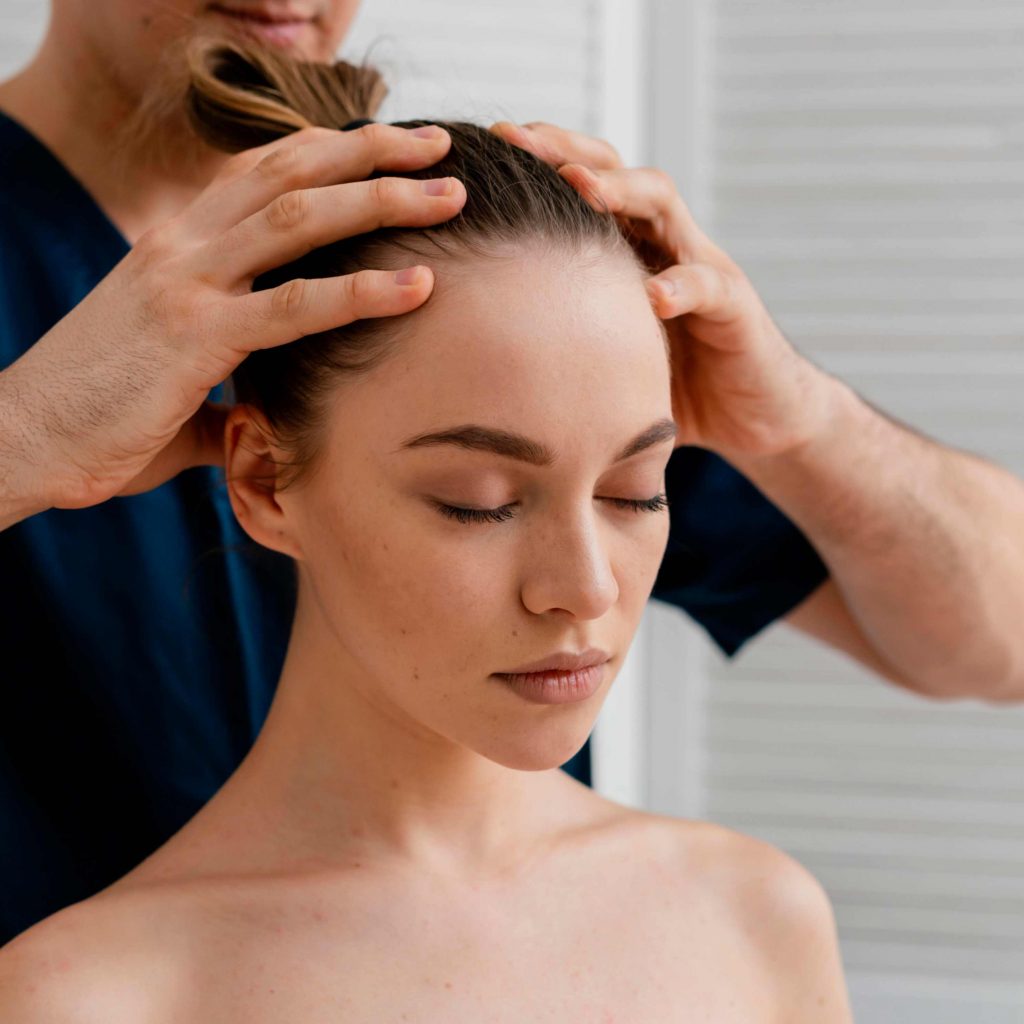
Do you know that scalp massage enhances nutrient supply, leading to better hair strands?
Why Scalp Massage Boosts Circulation
Regarding scalp health, head massage is among the top scalp health tips. Kneading the scalp has numerous benefits, including kickstarting blood flow. Improved circulation leads to better supply of vital nutrients and oxygen. Experts recommend a topical serum enriched with ingredients that promote blood circulation while stimulating hair growth.
Ensuring a Soothing and Effective Scalp Massage
Use the fleshy fingertip pads to tenderly massage the scalp, maintaining continuous contact for several seconds. Start at the temples and glide the fingers towards the back of the head and behind the ears for a soothing experience.
Promoting Hair Growth with Scalp Massage
Scalp massage facilitates better blood circulation in the hair follicles. It causes the blood vessels to expand, increasing blood flow. Hair follicle cells stretch out during the massage, leading to the production of thicker and healthier hair strands. Hence, you get voluminous hair when you massage the scalp regularly.
Scalp massage boosts circulation, enhancing nutrient supply for healthier hair. Use gentle fingertip pressure from temples to the back of the head.
3. Hydration and Moisturization
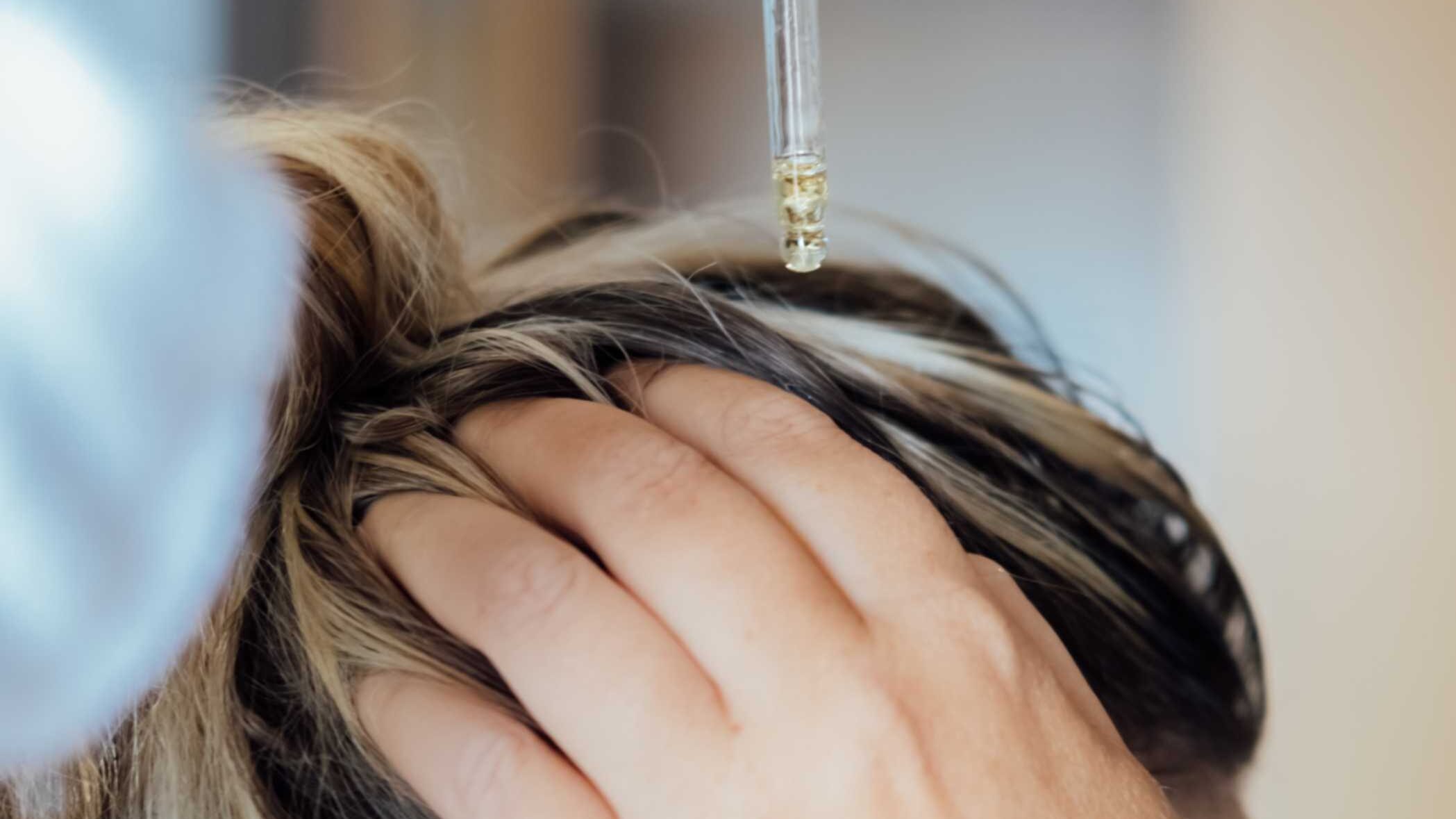
Your scalp needs hydration from within and moisturization to stay healthy.
Hydrating the Scalp to Prevent Dryness and Flakiness
Drinking water is an aspect of the best hair care routine for healthy hair. Adding it to your scalp care efforts can also help since moisture promotes scalp’s sebum production. Here is why:
- Preventing dryness and flakiness.
- Promoting blood circulation and skin elasticity.
- Protecting the scalp against irritation, itchiness, and other problems.
While experts recommend four to six cups per day, your lifestyle, location, and health will also play a role.
Choosing Moisturizing Hair Products
Oil-free humectants, such as glycerin and hyaluronic acid, are the best for moisturizing the scalp. Serums with such components can boost scalp health and hair growth. They enhance the scalp’s barrier function, while boosting its ability to retain moisture.
DIY Scalp Treatments for Hydration
Any guide on how to maintain a healthy scalp is only complete with DIY treatments for hydrating the scalp. DIY scalp treatments have a hydrating effect on a dry scalp. Also, they improve its health. For instance, coconut oil can moisturize the scalp. Its antibacterial and antifungal properties lower the risk of infections. Other DIY scalp treatments with hydrating effects include:
- Tea tree oil
- Apple cider vinegar
- Avocado
- Banana
- Jojoba oil
- Eggs and yogurt
- Olive oil and baking soda
- Aoe vera
- Witch hazel.
Hydrate your scalp with water, use oil-free humectants like glycerin, and try DIY treatments like coconut oil for hydration.
4. Scalp Exfoliation
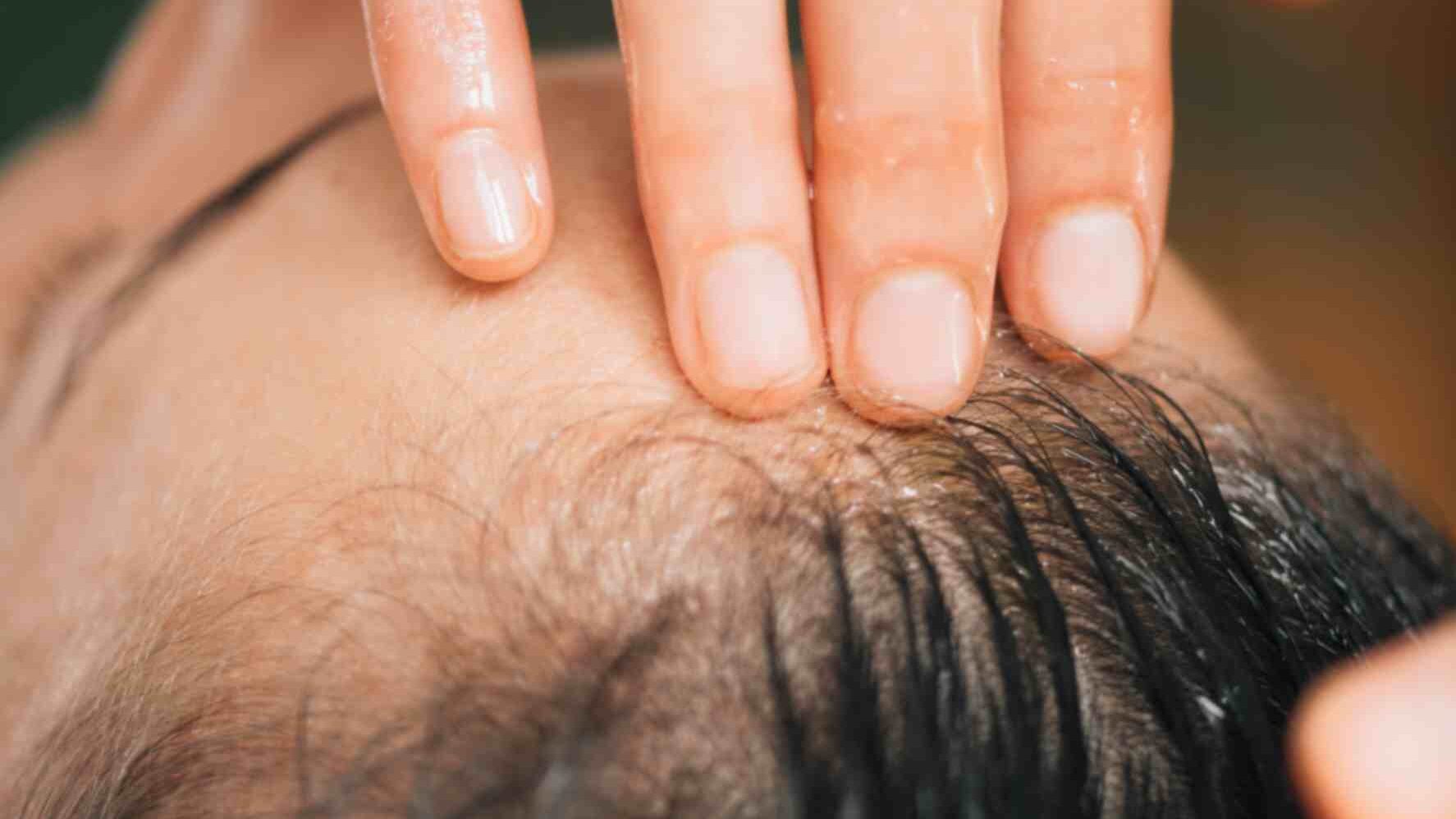
Exfoliating your scalp gently is another vital tip on how to improve scalp health.
The Importance of Scalp Exfoliation
Scalp exfoliation deep cleanses it, removing all the debris and gunk. This stress-relieving practice invigorates the scalp, and its beneficial to dry skin and oily hair. Dead skin cells are the components of human hair. However, the scalp is living skin. Hence, you need to care for it like your other body parts. Scalp exfoliation eliminates dead skin cells, excess oils, and debris, boosting hair growth.
Different Methods of Scalp Exfoliation
This process involves using a scrub, the way you do your face. You can use a chemical or physical scrub to remove dandruff, excess oils, and dead skin cells. Usually, you should perform scalp exfoliation on wet, just-shampooed hair. After combing and separating hair sections, use your fingertips to apply a scrub. Also, you can use a glove or a brush for exfoliation. When using a physical exfoliant, rub in a circular, gentle motion. Since your scalp can feel sensitive, apply a protective spray-on sunscreen to your hair to minimize sensitivity. Please see your dermatologist if you notice bumps, burning, itching, hair loss, or extreme dandruff and oiliness.
Frequency of Scalp Exfoliation and Precautions to Take
You can make scalp exfoliation part of another skin treatment, such as scalp massage. However, avoid exfoliating your scalp more than twice or once per week. Scalp exfoliation removes sebum, and doing it more often can trigger the scalp to overproduce this oil.
Maintain scalp health with gentle exfoliation, removing debris and promoting hair growth. Use a scrub or brush, but avoid overdoing it to prevent excess oil production.
5. Healthy Lifestyle Habits
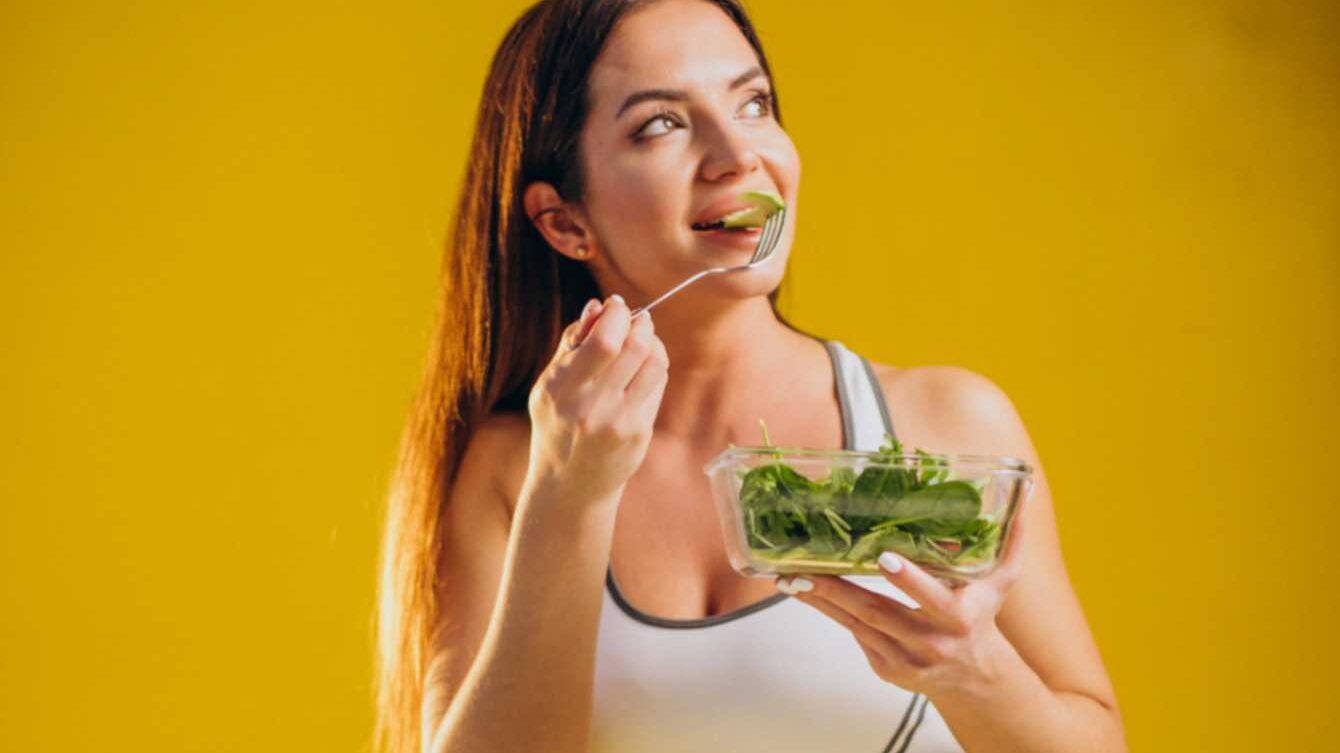
A healthy lifestyle tops the list of healthy and beautiful hair tips.
Impact of Diet and Hydration on Scalp Health
Your food and water intake affect your scalp health. A diet rich in the following is ideal for scalp health:
- Vitamin C
- B vitamins
- Zinc
- Iron
Such a diet nourishes the scalp and its components, including your hair and their follicles. By eating the right foods, you nourish the scalp, enabling it to support strong hair strands. Your diet may cause various problems, including a dry and flaky scalp.
Water hydrates the body, preventing flakiness and dryness, which contribute to various scalp conditions. Moreover, water enables the scalp skin to eliminate toxins. Hence, a dehydrated scalp can be itchy and dry, which eventually lead to hair thinning and loss.
Managing Stress for a Healthier Scalp
Stress can also influence your scalp health. Failure to manage it can cause dandruff, excess sebum production, itching, and hair shedding, among other issues. Hence, stress management is a crucial tip on how to get a healthy scalp. Among the top stress management techniques for a healthier scalp include meditation, deep breathing, and exercise. Moreover, positive thinking can help because drowning out negative thoughts restores peace of mind.
Maintain scalp health with a balanced diet rich in vitamins and minerals. Stay hydrated to prevent dryness and flakiness. Manage stress with techniques like meditation and exercise for a healthier scalp.
Why Protect the Scalp from Sun Exposure and Harsh Environmental Factors?
UV radiation and harsh chemicals can damage the scalp. Therefore, wear a hat to protect the scalp when out in the sun. Additionally, be careful with chemical treatments, relaxers, and perms wisely which can also affect your scalp’s health.
Scalp care is among the top tips on how to have healthy hair naturally. Remember, scalp is like the garden soil, and hair strands are the plants. Hence, producing healthy and beautiful hair requires a healthy scalp.






